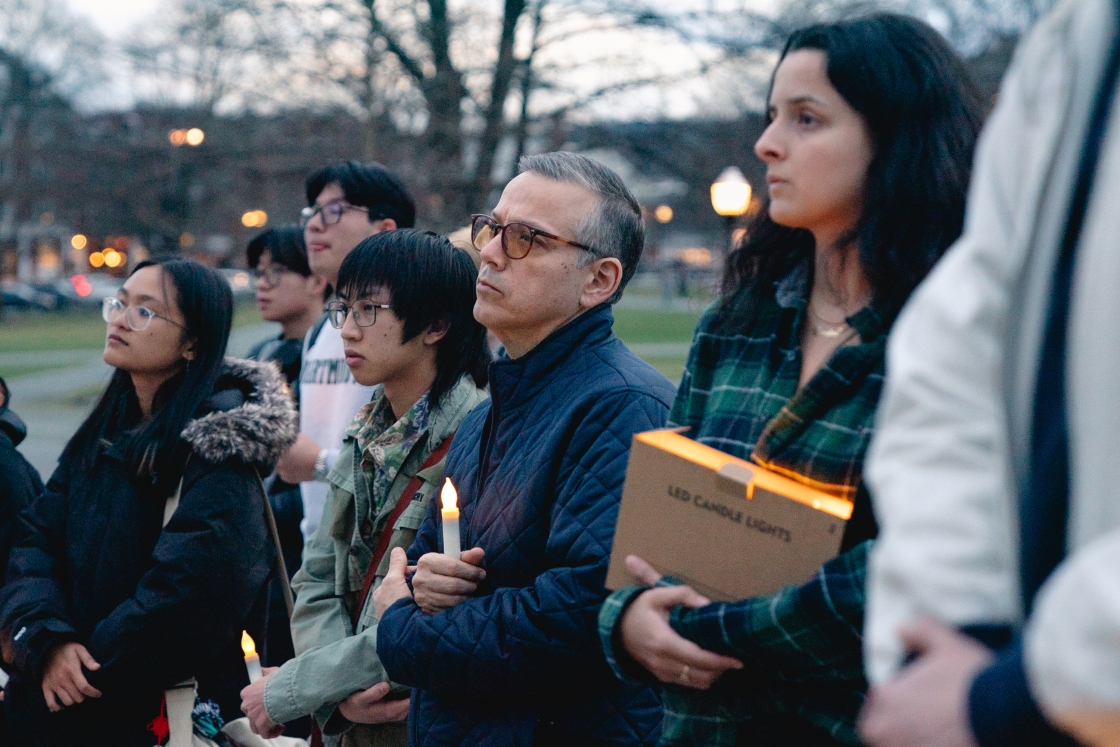Students, staff, and faculty heard about the College’s ongoing work to combat sexual assault at Friday’s Third Annual SPCSA Symposium on Sexual Assault.
More than 150 people spent the afternoon at the Student and Presidential Committee on Sexual Assault event in Collis Common Ground. They met in small groups to discuss various efforts Dartmouth has in place—and is continuing to improve—to prevent sexual assault, aid survivors, and hold perpetrators accountable.
They also heard details about some of the changes included in a comprehensive revision of Dartmouth’s sexual assault policy, on which the College is continuing to solicit community comment through April 14. The afternoon’s speakers included SPCSA members, students who have conducted research on sexual assault, and President Phil Hanlon ’77 and Dean of the College Charlotte Johnson.
“I was impressed by the doubling of attendance from last year’s symposium and glad to see such a wide range of people in the room—from first years to senior administrators—who managed to respectfully engage with and educate each other. It was heartening to have Leigh Remy and Dean Johnson speak in public so openly and be willing to take questions off the cuff from the room,” said SPCSA Chair Sophia Pedlow ’15. (Remy is director of the Office of Undergraduate Judicial Affairs.)
“I strongly believe that these conversations have begun something powerful, and that through the continued work of SPCSA and the College, the SPCSA’s annual recommendations to the College community will be carried forward and positively impact the community,” Pedlow added.
President Hanlon, who took questions from the audience and also participated in small-group discussions, told those assembled that their work against sexual assault is “crucially important.”
“I want to thank all of you for being here,” he said. “These are difficult topics and we do our best thinking at gatherings like this. You are a great resource for us.”
The group also heard about grant-funded research by a pair of undergraduates on methods to combat sexual assault. Bridget Lynn ’15 studied peer advising programs and Silvia Arora ’16 researched adjudication of sexual misconduct. Their work was funded through Elizabeth A. Hoffman Research Grants, which were created by the SPCSA with funds from the Office of the President and the Dean of the College. Elizabeth Hoffman ’13, who attended the symposium, is a former SPCSA president and worked against sexual violence while a Dartmouth student.
She told audience members that they are making a difference on a difficult problem.
“You may not see the benefit of your work immediately, but know that it is going to happen,” she said.
Johnson discussed the many ways Dartmouth groups are working to combat sexual assault through education, survivor support, prevention efforts, and community mobilization. She talked about the Dartmouth Bystander Initiative, which fosters a culture of intervention in which community members feel they can take steps to defuse threatening situations and prevent harm to their peers, and about the new Center for Community Action and Prevention, which will open in Robinson Hall this fall and will house the bystander program and serve as a hub for collaboration on other violence prevention efforts.
She also mentioned the upcoming summit on sexual assault to take place at Dartmouth in July. Participants will include university officials, government representatives, student activists, faculty, and national experts on sexual violence.
Johnson thanked those attending the symposium for the time and energy and for the contributions they have made to furthering Dartmouth’s efforts to eradicate sexual abuse.
“Your advocacy has made a real and lasting difference and we are grateful for your passion and for your commitment,” she said.

